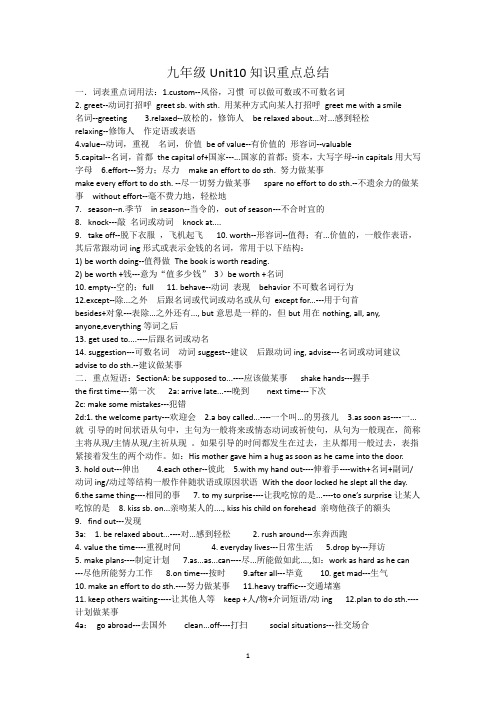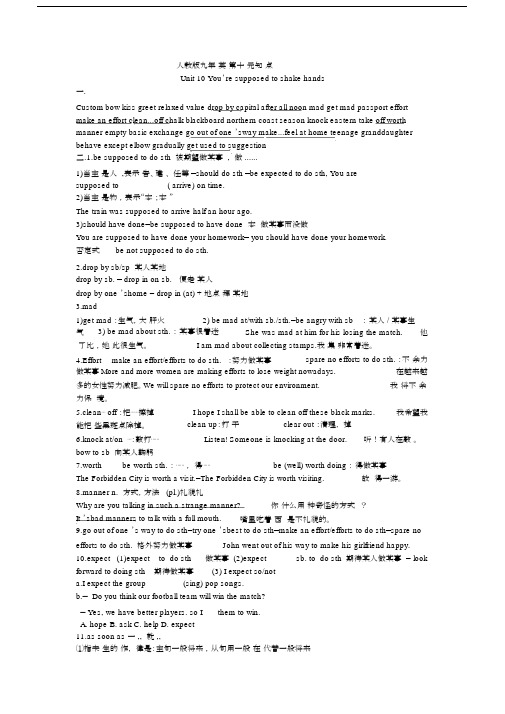九年级人教版英语第十单元笔记
Unit10知识重点总结 人教版新目标 英语九年级全册

九年级Unit10知识重点总结一.词表重点词用法:1.custom--风俗,习惯可以做可数或不可数名词2.greet--动词打招呼greet sb. with sth. 用某种方式向某人打招呼greet me with a smile名词--greeting 3.relaxed--放松的,修饰人be relaxed about...对...感到轻松relaxing--修饰人作定语或表语4.value--动词,重视名词,价值be of value--有价值的形容词--valuable5.capital--名词,首都the capital of+国家---...国家的首都;资本,大写字母--in capitals用大写字母6.effort---努力;尽力make an effort to do sth. 努力做某事make every effort to do sth. --尽一切努力做某事spare no effort to do sth.--不遗余力的做某事without effort--毫不费力地,轻松地7.season--n.季节in season--当令的,out of season---不合时宜的8.knock---敲名词或动词knock at....9.take off--脱下衣服,飞机起飞10. worth--形容词--值得;有...价值的,一般作表语,其后常跟动词ing形式或表示金钱的名词,常用于以下结构:1)be worth doing--值得做The book is worth reading.2)be worth +钱---意为“值多少钱”3)be worth +名词10.empty--空的;full 11. behave--动词表现behavior不可数名词行为12.except--除...之外后跟名词或代词或动名或从句except for...---用于句首besides+对象---表除...之外还有..., but意思是一样的,但but用在nothing, all, any, anyone,everything等词之后13.get used to....----后跟名词或动名14.suggestion---可数名词动词suggest--建议后跟动词ing, advise---名词或动词建议advise to do sth.--建议做某事二.重点短语:SectionA: be supposed to...----应该做某事shake hands---握手the first time---第一次2a: arrive late...---晚到next time---下次2c: make some mistakes---犯错2d:1. the welcome party---欢迎会 2.a boy called...----一个叫...的男孩儿 3.as soon as----一...就引导的时间状语从句中,主句为一般将来或情态动词或祈使句,从句为一般现在,简称主将从现/主情从现/主祈从现。
人教版英语九年级unit10知识点总结

人教版英语九年级unit10知识点总结Unit 10 Knowledge Points Summary - A Comprehensive Guide to Mastering EnglishIntroductionEnglish is a universal language that opens up numerous opportunities for communication, education, and career advancement. In unit 10 of the 9th-grade English course, several essential knowledge points are covered. This article aims to provide a comprehensive summary of these points and offer valuable insights to help students master English effectively.1. VocabularyVocabulary acquisition plays a crucial role in language learning. In unit 10, students encounter a variety of vocabulary words related to environment and pollution. To enhance their vocabulary skills, it is beneficial to adopt different strategies, such as reading extensively, using flashcards, and engaging in regular practice exercises. By incorporating new words into daily conversations or writing exercises, students can reinforce their understanding and retention.2. GrammarGrammar is the backbone of any language, including English. In unit 10, students focus on several essential grammar points. Firstly, they learn about the Passive Voice, which is used when the subject of the sentence is acted upon, rather than acting. Understanding the passive voice is essential for effective communication and diverse writing styles.Additionally, students delve into the usage of Modal Verbs, which express ability, possibility, necessity, or permission. Practicing modal verbs in different contexts can significantly improve students' language accuracy and fluency. It is also crucial to grasp the differences between similar modal verbs, such as 'can' and 'could', as well as 'may' and'might'.3. Reading ComprehensionEnhancing reading comprehension skills is vital for understanding complex texts and broadening one's knowledge. Unit 10 introduces students to a variety of reading passages related to environmental issues and conservation efforts. To improve reading comprehension, it is beneficial to scan the text beforehand for contextual clues, skimming for the main idea, and reading actively by underlining or highlighting key points. Students can also practice summarizing the texts to ensure a deeper understanding of the content.4. Listening SkillsListening is an integral part of effective communication. Unit 10 provides listening exercises centered around environmental concerns, such as global warming and deforestation. To enhance listening skills, it is essential to expose oneself to different types of audio resources, including podcasts, songs, and videos. Practicing listening comprehension regularly helps students develop their ability to identify key information, infer meaning from context, and recognize different accents and speech patterns.5. Speaking PracticeUnit 10 encourages students to engage in discussions related to environmental issues. This provides an excellent opportunity for students to express their opinions, debate varying viewpoints, and develop critical thinking skills. To improve speaking proficiency, it is beneficial to participate actively in classroom discussions, join speaking clubs or language exchange programs, and practice pronunciation and intonation patterns regularly.6. Writing SkillsWriting is an essential skill that enables effective expression and communication. In unit 10, students are encouraged to writeargumentative essays or persuasive speeches concerning environmental protection. To improve writing skills, it is crucial to develop a clear thesis statement, organize ideas logically, and provide supporting evidence. Students should also focus on enhancing their vocabulary usage, grammar accuracy, and overall coherence and cohesion in their writing.ConclusionUnit 10 of the 9th-grade English course covers significant knowledge points that are essential to mastering English. It is vital for students to develop vocabulary skills, grasp important grammar concepts, enhance reading and listening comprehension, improve speaking proficiency, and refine writing abilities. By dedicating time and effort to these areas, students will significantly enhance their English language proficiency and open doors to endless opportunities in their personal and professional lives.。
人教版英语九年级上册Unit10知识点详解

Unit 10 专题导入1. for the first time 第一次2. the first time ...第一次.....3. be supposed to do sth.应该做某事4. be expected to do sth.被期望做某事5. shake hands with sb.和某人握手6. hold out 伸出7. to on e's surprise令/使某人意外的是8. be relaxed about ...对.... 感到放松9. rush around匆忙赶路10. value the time 珍惜时间11. in one's everyday life 在日常生活中12. drop by顺便拜访;随便进入13. after all毕竟、终究14. get mad with sb.生某人的气15. make an /every effort to do sth.努力做某事16. heavy traffic繁忙的交通17. It's no big deal!小事一桩!18 clean ... off 把.... 擦掉19. be worth doing 值得做20. table ma nners 餐桌礼仪21. stick ... i nto ... 把..... 伸进 ...22. take off脱下;(飞机)起飞23. as ... as possible 尽可冃能.24. be worth the trouble 值得麻烦25. point at指着(侧重对象)26. point to指向(强调方向)27. go out of one's way to do sth.特地/努力做某事28. make sb. feel at home使.... 感到兵至如归29. be comfortable doi ng sth.自在地做某事30. feel good about doing sth.对做某事感觉良好31. behave well / badly 表现好/不好32. good / bad behavior 良好/恶劣举止33. Chinese customs 中国的习俗34. at the table 在桌上35. at table 就餐36. show up出现;显现;赶到;使 ..... 出丑37. show off炫耀;显摆38. show sb. around sp.带某人参观某处知识点梳理1. That's how people in Japan are expected to greet each other.这就是在日本人们应该互相问候的方式。
人教版九年级英语第十单元重点短语及句型知识点小结

人教版九年级英语第十单元重点短语及句型知识点小结Unit10 You are supposed to shake hands.一.重点词组1.be supposed to do sth被期望/要求做某事;应该2.shake hands握手3.drop by顺便拜访4.after all毕竟;终归5.pick up拾起;捡起接某人6.make a noise发出噪音7.table manners餐桌礼仪8.get used to习惯于9.be relaxed about对…随意/放松10.get mad大动肝火;气愤11.clean…off 把…擦掉12.take off脱下(衣服);(飞机等)起飞13.make an effort作出努力14.make sb feel at home使某人感到宾至如归15.cut up切开;切碎16.be expected to do 被期待做…17.make friends with与…交朋友18.as soon as一…就…19.to one’s surprise令某人吃惊的是20. be different from 与…不同21.on time 按时in time及时二.重点语法1.(1)suppose:猜想;假设suppose that表示“猜测;假设”,that可省例:I suppose he is a student.(2)be supposed to do sth被期望做某事,应该做某事。
相当于should 和ought to例:We are supposed to stop smoking.You are supposed to say hello to the foreigners.【练习】You are supposed_____hands when you meet for the first time.A.to shakeB.shakeC.shakingD.shook2.make plans to do == plan to do. 打算做某事例She has made plans to go to Beijing.=She has planed to go to Beijing.go out of one’s way to do 特意,专门做某事例:He went out of his way to make me happy.3.In Switzerland,it’s very important to be on time.分析:it是形式主语,不定式是真正的主语。
初中英语 人教版九年级 Unit 10 知识点归纳

词型转换1. kiss(v./n.)亲吻,接吻→(v.单三)kisses→(n.pl.)kisses2. greet(v.)和…打招呼, 迎接→greetings(n.)招呼, 问候3. relax(v.)放松→(adj.)relaxing令人放松的→relaxed放松的4. value(v.)珍视/(n.)价值→(adj.) valuable有价值的5.mad(adj.)很生气→(近)angry→(比/最)madder/maddest6. north(n.)北方→northern(adj.)北方的south(n.)南方→southern(adj.)南方的west(n.)西方→western(adj.)西方的east(n.)东方→eastern(adj.)东方的7. empty(adj.)空的→full(反义词)满的8. behave(v.)→behavior(n.) 举止, 表现9. suggest(v.)建议→(n.)suggestion建议→(pl.)suggestions advise(v.)建议→(n.)advice建议[U]10. base(n.)基础, 基本→basic(adj.)基本的, 基础的11. gradual(adj.)逐步的→gradually(adv.)逐步地,逐渐地12. change(v./n.)改变→exchange(v./n.)交换13. teenage(adj.)青少年的→(n.)teenager青少年14. polite(adj.)有礼貌的→(adv.)politely有礼貌地impolite(adj.)没礼貌的→(adv.)impolitely没礼貌地15. manner(n.)方式, 方法→manners (pl.)礼貌, 礼节16. except (prep.)除外(不包括)→besides(prep.)除…外(包括)短语归纳Section A1. be (not) supposed to do sth. (不)应该做某事2. be expected to do sth. 应该/被期望做某事3. shake hands with sb.= shake one’s hand和某人握手(shook/shaken)4. bow to/before sb. 向某人鞠躬5. for the first time 首次,第一次6. an exchange student 一名交换生7. greet sb.( in) the wrong way 以错误的方式问候某人8. be invited to sp.被邀请去…be invited to do sth.被邀请做…9. the welcome party 欢迎会10. hold out my hands 伸出我的手11. to one’s surprise 令某人惊讶的是12. kiss sb. on both sides of sb.’s face 亲吻某人的脸颊13. be relaxed about time 时间观念比较随意14. a bit/ little late 晚一点15. value the time we spend with sb. 珍惜我们与某人度过的时间16. drop by sp.= visite sp. 顺便访问某地17. the capital of clocks and watches 钟表之都18. make plans to do sth.= plan to do sth. 计划做某事19. be on time 守时after all 毕竟;终归20. get mad 大动肝火be/get mad at/with sb. 生某人的气21. make an effort to do sth. 努力做某事22. as…as possible = as…as sb. can/could 尽某人可能…23. sth. be worth doing 某事值得去做24. go abroad 出国at noon 在正午25. in our everyday/daily lives 在我们的日常生活中26. avoid doing sth.避免做某事avoid heavy traffic避免交通拥挤27. It’s no big deal. 这没什么大不了的28. clean…off 把…擦掉table manners餐桌礼仪29. take off脱下; (飞机等)起飞;→(反)put on穿上/ land着陆Section B1. stick your chopsticks into the food 把筷子插进食物里2. point at sb. with the chopsticks 用筷子指着某人3. use your chopsticks to hit an empty bowl 用你的筷子敲空碗4. on an exchange program 在一个交流项目中5. go out of one’s way to do sth. =try one’s best to do sth.6. make sb. feel at home 使某人感到宾至如归7. thanks for (doing)…因(做了)…而感谢8. There is no reason (for sb.) to do sth.(某人)没有理由做某事9. host family 寄宿家庭10.about one’s age 和某人年龄相仿11. be comfortable doing sth. 轻松自如地做某事12. the biggest challenge 最大的挑战13. learn how to behave at the dinner table学习如何在餐桌上表现得体14.be different from …和…不同15. cut up = cut…into pieces 把…切碎16. find it difficult to do sth. 发现做某事很难17. feel good about (doing)…对(做)…感觉很好18. get/be used to (doing) sth. 习惯于(做)某事19. have a good school year 度过一个愉快的学年20.behave properly举止得体behave well/badly表现好/不好21. have a safe trip 祝你一路平安22. show up 露面,出现123. knock on/at the door 敲门24. look forward to doing sth. 盼望做某事知识点总结1. suppose (v.) “猜想;以为;假定”1) suppose + that从句“猜测; 假定”(否定前移)2) be (not) supposed to do sth. “(不)应该做某事”①人+ be supposed to do sth. = should do sth.“某人应该做某事”如:Everyone is supposed to wear a seat-belt in the car.②物+be supposed to do sth. (某事本应该发生而没有发生)如:The train was supposed to arrive half an hour ago.③be supposed to have+过分词(过去本应该做某事实际没做) 如:You are supposed to have handed in your home work by now.2.expect (v.) “预料,盼望,期待”①expect + n./pron. “预计…可能发生; 期待某人/某物”如:I expect a snowstorm. 我预计会有一场暴风雪②expect + to do sth. “期待做某事”be expected to“被期待做某事”③expect sb. to do sth. “期望某人做某事”④expect +从句“预计/料想…” .3. greet sb. = say hello to sb.“问候/迎接某人”(greeted/greeted)greet sb. with a smile “面带微笑问候/迎接某人”4. get to+地点名词= reach +地点名词= arrive in/at +地点名词[注]get/arrive/reach+here/there/home “到这儿/那儿/家”5. kiss sb. on…= give sb. a kiss on…“亲吻某人的…”6. be relaxed about sth. “对某事随意, 不严格”7. be of value = be valuable “…有价值的”8. invite sb. to +地点/活动“邀请某人到某地/参加…活动”invite sb. to do sth. “邀请某人做某事”9. drop (v.) (使)落下,下降,减少如:The temperature dropped a lot last night.drop by +地点名词“顺便访问/去某地”10. be mad at sb.=be angry with sb. “生某人的气”11. clean sth. off…“把某物从…擦掉”如:Clean the chalk off the blackboard. 擦掉黑板上的粉笔。
人教版九年级英语第十单元知识点总结(推荐文档).doc

人教版九年英第十元知点Unit 10 You’re supposed to shake hands一.Custom bow kiss greet relaxed value drop by capital after all noon mad get mad passport effort make an effort clean...off chalk blackboard northern coast season knock eastern take off worth manner empty basic exchange go out of one ’sway make...feel at home teenage granddaughter behave except elbow gradually get used to suggestion二.1.be supposed to do sth 被期望做某事 ,做 ......1)当主是人 ,表示告、建、任等 =should do sth =be expected to do sth, You aresupposed to___________( arrive) on time.2)当主是物,表示“本;本”The train was supposed to arrive half an hour ago.3)should have done=be supposed to have done 本做某事而没做You are supposed to have done your homework= you should have done your homework.否定式be not supposed to do sth.2.drop by sb/sp 某人某地drop by sb. = drop in on sb. 便走某人drop by one ’shome = drop in (at) + 地点拜某地3.mad1)get mad :生气,大肝火2) be mad at/with sb./sth.=be angry with sb :某人 / 某事生气3) be mad about sth. :某事很着迷She was mad at him for his losing the match. 他了比,她此很生气。
人教版九年级英语第十单元B部分知识点

人教版九年级英语第十单元B部分知识点随着社会的发展和交流的加强,学习英语成为了一项重要的技能。
而对于九年级的学生来说,英语的学习更显重要。
本文将针对人教版九年级英语第十单元B部分的知识点展开论述,帮助同学们更好地掌握这些内容。
首先,我们来看看动词的不定式用法。
不定式是英语中的一种非谓语动词形式,一般由“to+动词原形”构成。
在这个部分中,我们学习了不定式作宾语、作定语、作状语等不同的用法。
不定式作宾语时,可放在动词后面,表示动作的目的或意图。
例如:She wants to learn English.(她想学英语);不定式作定语时,放在名词或代词之后,修饰名词或代词的含义。
例如:The book to read is on the desk.(要读的书在桌上);不定式作状语时,可以修饰谓语动词、形容词或副词等。
例如:He went to the park to play football.(他去公园踢足球)。
接下来,我们来讨论被动语态的用法。
被动语态是英语语法中的一个重要部分,用来表示动作的承受者或施事者。
被动语态的构成是由“助动词be+动词的过去分词”构成。
在第十单元的B部分,我们学习了被动语态的基本用法,以及一些常用的被动语态句型。
例如:This book was written by Mark Twain.(这本书是马克·吐温写的)。
被动语态的运用能够使句子结构更加丰富,表达更准确。
此外,本单元还介绍了一些关于情态动词的高级运用。
情态动词是一种特殊的动词形式,用来表示情绪、意愿、能力、推测等。
在此部分,我们学习了“情态动词+have done”的用法。
例如:He must have arrived at the station.(他肯定已经到站了)。
情态动词的运用可以使表达更加委婉有力,增加语言的表达效果。
最后,我们来谈谈条件和假设句的使用。
在英语中,条件句和假设句是一种常见的句式,用来表达假设、条件或推测等。
人教版九年级英语第10单元知识点

人教版九年级英语第10单元知识点教学过程一、词汇讲解1. by the time 直到…时候指从过去某一点到从句所示的时间为止的一段时间如:By the time we got to his house;he had finished supper.在我们到达他就已经吃完了晚饭。
2. 英语中表示“把某物遗忘在某处”常用leave + 地点而不是forget+地点如:Unluckily;I left my book at home. 不幸的是;我把书忘在家里了。
3. close v. 关adv. 接近地靠近地closed adj. 关的出版、出来5. on time按时准时既不早也不迟in time及时指在时限到来之前6. luckily adv. 幸运地lucky adj. 幸运的luck n. 好运7. give sb. a ride 让某搭便车如:He often gives me a ride to school. 他经常让我搭便车去学校。
8. only just 刚刚好、恰好9. go off (闹钟)闹响The alarm went off just now. 刚才警钟响了。
10. break down坏掉break out 爆发11. fool n. 傻子呆子v. 愚弄欺骗.fool sb 愚弄某人。
Foolish adi.愚蠢的He is a fool. 他是一个呆子。
We can’t fool our teach. 我们不能欺骗我们的教师。
(动词)12. show up出现出席She di dn’t show up last night. 昨晚她没有出现13. invite sb. to do sth. 邀请某人做某做事如:My friend invited me to watch TV. 我的朋友邀请我看电视。
14. set off 激起出发set up建立set off=set out 出发/起程15. ①so … that如此…以致于引导结果状语从句;so后面接形容词、副词.②so that作“为了”时;引导目的状语从句;从句常出现情态动词;作结果状语从句时;从句中一般不用情态动词。
- 1、下载文档前请自行甄别文档内容的完整性,平台不提供额外的编辑、内容补充、找答案等附加服务。
- 2、"仅部分预览"的文档,不可在线预览部分如存在完整性等问题,可反馈申请退款(可完整预览的文档不适用该条件!)。
- 3、如文档侵犯您的权益,请联系客服反馈,我们会尽快为您处理(人工客服工作时间:9:00-18:30)。
九年级人教版英语第十单元笔记
第一节
1. 单词
在本单元中,我们学习了许多新的单词,如environment, protect, pollution, recycle等等。
这些单词都与环境保护和污染有关。
2. 短语
除了单词外,我们还学习了许多与环保相关的短语,比如throw away, turn off, take care of等等。
这些短语在日常生活中非常有用。
3. 语法
本单元主要学习了情态动词的用法,包括can, could, may, might, must等。
这些情态动词在表达建议、可能性和必要性时非常重要。
第二节
1. 阅读
在本单元的阅读部分,我们了解了一些环境问题,比如气候变化、水污染、垃圾处理等。
这些内容让我们意识到环境问题的严重性。
2. 写作
本单元的写作任务是写一篇关于环保的短文。
在写作过程中,我们能
够运用到本单元所学的词汇和语法知识,提高了我们的写作能力。
第三节
1. 听力
通过本单元的听力练习,我们可以提高自己的听力水平,同时也了解
了一些有关环境保护的信息。
2. 口语
在口语练习中,我们能够更加流利地表达关于环境保护的想法,培养
了我们的口语能力。
总结与回顾
在学习九年级人教版英语第十单元时,我们深入了解了环境保护的重
要性,同时也掌握了相关的词汇、短语和语法知识。
通过阅读、写作、听力和口语练习,我们的综合能力都得到了提升。
个人观点
我认为环境保护是每个人都应该关注的问题,在学习本单元的过程中,我深刻意识到了环境污染对人类的影响。
希望大家能够共同努力,保
护我们的地球家园。
这篇文章深入介绍了九年级人教版英语第十单元的内容,既包括了词汇、短语和语法知识的学习,也包括了阅读、写作、听力和口语练习
的内容。
文章也提及了环境保护的重要性,并包括了我的个人观点。
希望这篇文章能够帮助你更好地理解和复习本单元的内容。
本单元的
内容涉及了许多关于环境保护的重要知识和技能,让我们更加关注并
了解了这一全球性的问题。
除了学习相关的词汇、短语和语法知识外,我们还需要思考如何在日常生活中实际行动起来,为环境保护出一份力。
在这个单元中,我们学习了许多关于环境污染和环境保护的词汇,比
如environment, protect, pollution, recycle等。
这些词汇帮助我们
更好地理解和描述环境问题,同时也提醒我们应该如何保护我们的环境。
在这方面,学会使用这些词汇并意识到它们的重要性非常关键。
除了词汇外,我们还学习了许多与环保相关的短语,比如throw away, turn off, take care of等等。
这些短语在日常生活中非常有用,能够
帮助我们减少浪费,节约能源,从而为环境保护出一份力。
在语法方面,本单元主要学习了情态动词的用法,比如can, could, may, might, must等。
这些情态动词在表达建议、可能性和必要性时非常重要。
通过学习这些语法知识,我们能够更准确地表达自己的意
思,同时也能够更好地理解他人的观点和建议。
在阅读和写作方面,本单元的阅读部分让我们了解了一些环境问题,
比如气候变化、水污染、垃圾处理等。
这些内容让我们意识到环境问
题的严重性,从而激发了我们想要为环境保护做出贡献的愿望。
而写
作部分则让我们有机会用所学的知识和词汇来表达自己对环保的看法
和建议,提高了我们的写作能力。
通过听力和口语练习,我们可以更好地了解环境保护的信息,同时也
能够更加流利地表达自己的想法,培养了我们的口语能力和听力水平。
这些技能对我们日常生活中与他人交流和对环境问题进行讨论都非常
重要。
通过学习这一单元的内容,我们不仅掌握了相关的知识和技能,还深
刻意识到了环境保护的重要性。
我个人认为,环境保护是每个人都应
该关注的问题。
希望大家能够共同努力,从自身做起,采取实际行动,为保护我们的地球家园出一份力。
只有在每个人的共同努力下,我们
才能真正实现环境保护的目标。
希望我们能够将这些学到的知识和技
能转化为实际行动,为创造一个更加美好的环境而努力。
